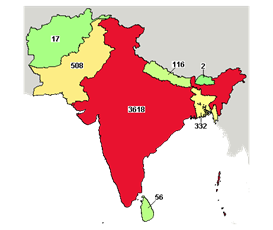Next story:
Make in India for Clinical Research Needed: ISCR
Published on February 17, 2019
New Delhi: “The changing profile of diseases affecting the Indian population, the continuing high prevalence of endemic diseases and the emergence of lifestyle diseases all point to an urgent need for greater investment in research and innovation to address India‘s increasing disease burden and the incremental costs associated with it,” said Dr Chirag Trivedi, President, Indian Society for Clinical Research (ISCR) speaking at the commencement of the 12th Annual ISCR Conference being held in Delhi. “Stakeholders need to work together to build and strengthen the clinical research ecosystem in the country and create an environment that encourages more research. At the same time, there is a need for more education and awareness about clinical research and its benefits not just to  participating patients, but also to society at large.”
participating patients, but also to society at large.”
 participating patients, but also to society at large.”
participating patients, but also to society at large.”Recent data from www.clinicaltrials.gov indicates that the number of clinical trials being done in India as a percentage of global trials continues to fall. From 1.5% a couple of years ago, the percentage of clinical trials in India is now 1.2% which is inadequate for a country that has the second highest population and the highest disease burden in the world.
It is against this background that ISCR is holding its Conference on the theme Clinical Research Advancing the Frontiers of Health. The Conference, being attended by 500+ clinical research professionals, is focusing on various clinical trial reforms that will build the future research enterprise as well as on emerging research opportunities in India.
“Clinical research in India is governed by robust local and global regulations which makes India amongst the most stringent clinical research regulatory environments in the world. In such an environment we need to encourage, not deter, not-for-profit organisations, institutions and biopharma companies from doing more research in India,” said Dr Sanjay Mittal, Senior Director – Clinical Cardiology & Head of Research, Medanta – The Medicity. “The most impacted by the current environment are patients who will not have access to the latest and most effective treatment for various medical conditions. For us investigators too, participating in clinical research exposes us to the latest trends and treatment protocols which, in turn, benefits our practice and patients.” A clinical trial patient at the media briefing shared his experience of participating in a clinical trial and the rigour of the process, while highlighting how the trial benefited his condition.
Through two days of panel discussions, the ISCR Annual Conference will examine and discuss varied perspectives about clinical research from patients, investigators, regulators and academia. Emerging trends in clinical research, as also career opportunities in clinical research will be discussed during the panels. Parallel to the main track, a separate track focused on Data Management, Medical Writing and Biostatistics is being held.
Dr Trivedi said that it was imperative that more is done to highlight the robust regulatory environment in India to stakeholders across the world so as to encourage more investment in clinical research in India. A conducive clinical research ecosystem will encourage more research and development and will give an impetus to the Government of India’s ‘Make in India’ initiative. “We are as committed to the DCGI’s commitment to making safe, efficacious, affordable and quality medicinal products for our people. If we can have a Make in India for other goods and services, why cannot we have a Make in India for clinical research too?” concluded Dr Trivedi.
The choice of a country for clinical trials is based on a number of factors including the epidemiology and disease prevalence; access to qualified and GCP-trained investigators; the availability of good infrastructure as well as the future commercial plans for the new medicine. The choice of patients in a study is based on the inclusion-exclusion criteria in the protocol which determines which patients are eligible to participate in a study based on their disease profile and health indicators. In the larger context of India’s unique healthcare requirements and the growing incidence of endemic diseases and emerging lifestyle diseases, more clinical research is needed to develop new and effective medicines and vaccines to tackle the country’s mammoth disease burden and unmet medical needs. India has 18% of the world’s population and 20% of the global disease burden and yet, 1.2% of global trials take place in India.
ISCR seeks the media’s support in bringing a more balanced debate to the discussion on clinical research in India. Even as there may be violations and deviations which are far and few between, there are robust guidelines, regulations and oversight mechanisms in place for the conduct of clinical research in India. Independent studies and audits have confirmed the high quality of clinical research being done in India and this needs to be highlighted as well to create more confidence amongst global stakeholders about doing clinical trials in the country.






















